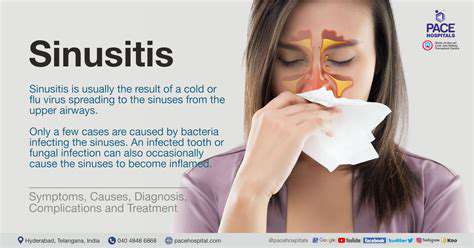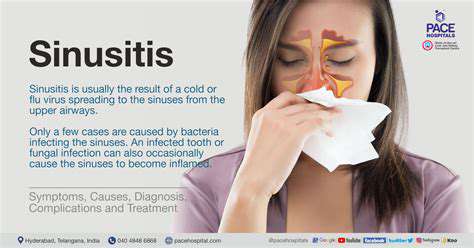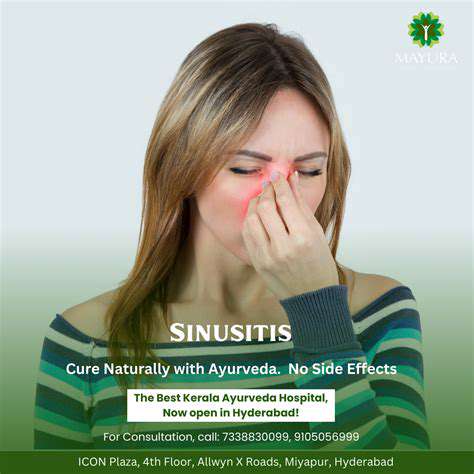What is Sinusitis?

Understanding the Sinuses
The sinuses are air-filled cavities located around the nasal passages. They play a crucial role in easing the weight of the skull, producing mucus, and aiding in vocal resonance.
When the sinuses are healthy, they remain open and allow mucus to drain, but blocked or inflamed sinuses can lead to various complications, including chronic sinusitis.
Causes of Sinusitis
Sinusitis can occur due to infections, allergies, or structural issues within the nasal cavity, such as polyps or a deviated septum. Identifying the underlying cause is essential for effective treatment and management.
Viral infections, particularly the common cold, are the most prevalent triggers, but bacteria and fungi can also contribute to more persistent cases of sinusitis.
Symptoms of Chronic Sinusitis
Common symptoms include nasal congestion, facial pain or pressure, and thick nasal discharge. Individuals may also experience reduced sense of smell and fatigue.
In chronic cases, symptoms can last for weeks or months, significantly affecting one’s quality of life and daily activities.
Treatment Options
Treatment for chronic sinusitis often begins with medication, including nasal sprays, antihistamines, or antibiotics, depending on the cause. In some cases, surgery may be needed to remove blockages and improve drainage.
Additionally, lifestyle changes, such as using a humidifier or staying hydrated, can help alleviate symptoms and prevent recurrences of sinusitis.
The Importance of Diagnosis
Accurate diagnosis is critical for determining the appropriate course of treatment for chronic sinusitis. This may involve imaging tests or referral to a specialist.
Without proper intervention, chronic sinusitis can lead to further health issues, making timely medical advice essential for effective management.
Symptoms of Sinusitis
Common Signs and Symptoms
Chronic sinusitis often presents with a range of symptoms that can significantly affect an individual's daily life. One of the most common signs is nasal congestion, which can lead to difficulty breathing through the nose. This congestion occurs due to the inflammation of the sinus cavities.
Patients may also experience facial pain or pressure, especially around the cheeks, eyes, and forehead. This discomfort can intensify when bending over or lying down, often indicating the presence of an infection.
Another frequent symptom is a persistent cough, which typically worsens at night and may disrupt sleep. The cough is often caused by postnasal drip, where mucus from the sinuses drips down the back of the throat.
Foul-smelling nasal discharge, or halitosis, can also accompany chronic sinusitis. This is often due to bacterial growth in the sinuses and can be particularly distressing for those affected.
Other symptoms may include fatigue, reduced sense of taste or smell, and ear pressure or fullness, further adding to the discomfort and complications associated with chronic sinusitis.
Diagnosis and Evaluation
Diagnosing chronic sinusitis typically begins with a thorough medical history and physical examination. Healthcare providers often inquire about the duration and severity of symptoms, as well as any previous episodes of sinusitis.
In some cases, medical professionals may use imaging techniques, such as CT scans, to visualize the sinus cavities. This imaging assists in identifying blockages, inflammation, or anatomical issues that may contribute to chronic sinusitis.
Endoscopic sinus examination can also be employed, allowing doctors to directly visualize the sinuses using a small camera. This technique provides valuable information regarding the condition of the sinuses and helps in formulating an effective treatment plan.
Allergy tests may be recommended to identify potential allergens that could exacerbate sinus conditions. Understanding these triggers is essential for managing symptoms and preventing future episodes.
Overall, a comprehensive evaluation is critical to confirm a diagnosis of chronic sinusitis and to rule out other potential causes of nasal congestion and discomfort.
Treatment Options and Management
Management of chronic sinusitis involves a multi-faceted approach, focusing on alleviating symptoms and addressing the underlying causes. Intranasal corticosteroids are commonly prescribed to reduce inflammation and relieve nasal congestion.
Saline nasal irrigations can also help clear mucus and allergens from the nasal passages, promoting better drainage and relief from symptoms. This simple practice can be particularly effective in maintaining sinus health.
Antibiotics may be prescribed if a bacterial infection is suspected, though they are not always necessary. Depending on the severity of the condition, some individuals may require more advanced treatments, such as surgery, to correct structural issues in the sinuses.
In addition to medical treatments, lifestyle modifications such as staying hydrated, avoiding known allergens, and using a humidifier can all aid in managing chronic sinusitis symptoms.
Continuous follow-up with healthcare providers is essential for those with chronic sinusitis to monitor their condition and adjust treatment plans as necessary, ensuring the best possible quality of life.
Causes of Sinusitis

Understanding the Factors Behind Sinusitis
Chronic sinusitis often results from a combination of factors that can lead to persistent inflammation of the sinus cavities. These factors may include allergies, infections, or anatomical anomalies. Understanding these underlying causes can help in developing effective treatments.
Allergies, such as those caused by pollen, dust mites, or pet dander, can trigger a sinus response that causes congestion and pressure. Over time, repeated allergic reactions can lead to chronic nasal inflammation and sinusitis.
In addition to allergies, viral infections such as the common cold can also play a significant role. When a viral infection occurs, it can cause swelling of the sinus linings, leading to blockages that exacerbate congestion. This can create an environment where bacteria thrive, potentially leading to secondary bacterial infections.
Treatment Options for Sinusitis
Treating chronic sinusitis usually involves a multifaceted approach, which may include medications, lifestyle changes, and sometimes surgical interventions. Over-the-counter decongestants can help reduce swelling and improve sinus drainage, providing immediate relief from symptoms.
In more severe cases, prescription medications such as corticosteroids may be necessary to address inflammation and prevent flare-ups. For individuals with allergies, antihistamines can also be beneficial in managing symptoms and reducing sinusitis episodes.
When medical treatments are ineffective, surgery may be considered to remove obstructions or correct anatomical issues within the sinuses. Endoscopic sinus surgery, for example, can provide significant relief for those who suffer from recurrent or chronic sinusitis. This procedure aims to restore normal sinus function and improve quality of life.
Treatment Options for Sinusitis
Treatment with Medications
Medications are often the first line of treatment for chronic sinusitis. These can include antibiotics for bacterial infections, as well as corticosteroids to reduce inflammation. Patients may be prescribed nasal sprays that deliver medication directly into the sinuses, aiming to alleviate congestion and promote drainage.
Over-the-counter (OTC) medications, including decongestants and antihistamines, can also be helpful. Decongestants work by shrinking swollen nasal tissues, providing temporary relief from nasal congestion. Antihistamines are beneficial if allergies contribute to sinusitis symptoms.
It is important to consult with a healthcare provider to determine the appropriate medication, as misuse can lead to side effects or further complications. Regular follow-ups may be necessary to assess treatment efficacy and make adjustments as needed.
Home Remedies and Lifestyle Changes
Many individuals seek relief from chronic sinusitis through home remedies. Inhaling steam from a hot shower or a bowl of hot water can help clear nasal passages. Additionally, staying hydrated and using a humidifier may keep mucus thin and facilitate drainage.
Saltwater rinses, through a neti pot or saline nasal sprays, can also provide significant relief by flushing out irritants and keeping the nasal passages moist. Regularly practicing this can help minimize symptoms over time.
Furthermore, adopting a lifestyle that includes avoiding known allergens and irritants, such as smoke or pollution, is crucial. Incorporating a nutritious diet rich in anti-inflammatory foods may also support overall sinus health.
Advanced Medical Interventions
For individuals who do not respond to conventional treatments, advanced medical interventions may be necessary. In some cases, procedures like balloon sinuplasty can be performed. This minimally invasive technique involves inserting a small balloon into the nasal passages and inflating it to open up blocked sinuses, enhancing drainage.
For more severe cases, surgical options may be explored. Functional endoscopic sinus surgery (FESS) is a common procedure that aims to remove obstructions, such as polyps, and enlarge the sinus openings to improve airflow and drainage.
Patients considering surgical options should have a thorough discussion with an ENT specialist to understand the benefits and risks involved, as well as the recovery process and potential impacts on their quality of life.
Managing Chronic Sinusitis Long-term
Long-term management of chronic sinusitis often relies on combining various treatment modalities. Regular consultations with healthcare professionals can help in monitoring symptoms and preventing flare-ups. This may include periodic imaging studies to assess nasal and sinus structures.
Patients may also benefit from allergy testing to identify any allergens that could be exacerbating their symptoms, leading to tailored management strategies. Targeted immunotherapy is an option for some individuals, working to desensitize the immune system to specific allergens over time.
Moreover, maintaining good respiratory hygiene, such as practicing proper hand washing and avoiding close contact with sick individuals during flu season, can help reduce the likelihood of infections that may trigger sinusitis episodes.
Prevention Tips for Sinusitis

Understanding Sinusitis and Its Triggers
Sinusitis, or inflammation of the sinuses, can significantly impact quality of life. It occurs when the nasal cavities become swollen or inflamed, often due to infections, allergies, or other factors. Common triggers include allergens like pollen, mold, and pet dander. Viral infections, such as the common cold, can also lead to sinusitis. Understanding these triggers is essential for effective prevention and management.
People with a history of respiratory issues are particularly vulnerable. Environmental factors like smoke and pollution may also exacerbate the condition. A consultation with healthcare professionals can provide insight into managing these triggers more effectively.
In some cases, anatomical issues, such as a deviated septum, may contribute to the chronicity of sinusitis. Regular monitoring of symptoms can help identify patterns associated with flare-ups. Being proactive about recognizing these triggers can lead to more effective prevention strategies.
It’s worth noting that sinusitis can be classified as either acute or chronic. Acute sinusitis often resolves with treatment, while chronic sinusitis can persist for months or even years. Understanding the difference helps in determining the appropriate intervention.
Effective management often begins with identifying personal triggers. Keeping a symptom diary can help in recognizing which factors contribute to sinusitis flare-ups. This information can prove invaluable when discussing treatment options with a healthcare provider.
Home Remedies for Sinusitis Relief
For those suffering from sinusitis, several home remedies can offer relief. Steam inhalation is a popular method that helps to open nasal passages and ease congestion. Adding essential oils, such as eucalyptus, can further enhance the soothing effects.
Staying hydrated is also crucial, as it helps thin mucus in the sinuses. Drinking plenty of fluids, including warm teas and broths, can provide comfort. Saline nasal sprays or rinses can help clear out nasal passages and reduce inflammation.
Using a humidifier can keep the air moist, which is beneficial during dry seasons or in heated indoor environments. Additionally, applying warm compresses to the face may relieve sinus pressure and pain. Combining these remedies can create a comprehensive approach to relief.
Diet can play a supportive role in managing sinusitis symptoms. Anti-inflammatory foods, such as ginger, garlic, and turmeric, may help reduce swelling. Incorporating foods rich in antioxidants can also bolster the immune system and aid recovery.
While home remedies can be effective, it’s essential to monitor symptoms closely. If they persist or worsen, seeking medical advice is advisable. A healthcare provider can offer additional treatment options to ensure proper care.
Lifestyle Changes to Reduce Sinusitis Occurrences
Making specific lifestyle changes can significantly impact the frequency of sinusitis episodes. Regular exercise can improve overall health and boost the immune system. Maintaining a healthy diet with plenty of fruits and vegetables enhances nutritional intake and immune function.
Avoiding known allergens is crucial for those at risk of sinusitis. This might include regular cleaning to reduce dust, using air purifiers, and avoiding smoking. Creating a clean indoor environment can minimize exposure to irritants.
Managing stress is also an often-overlooked aspect of health that can affect sinus health. Stress can weaken the immune system, making the body more susceptible to infections. Incorporating relaxation techniques, such as yoga or meditation, may be beneficial.
Additionally, ensuring adequate sleep is vital for recovery and prevention. Sleep allows the body to repair and strengthen the immune system. Establishing a consistent sleep schedule can lead to better overall health and resilience against sinusitis.
Lastly, regular check-ups with a healthcare provider can be invaluable. Discussing any chronic conditions or medications can help tailor a preventative strategy for maintaining sinus health. Building a partnership with healthcare professionals aids in long-term management.
When to Seek Medical Attention for Sinusitis
Knowing when to seek medical attention for sinusitis is important for effective management. If symptoms persist for more than 10 days or worsen after initially improving, it’s time to consult a healthcare provider. Persistent symptoms might indicate a bacterial infection that requires antibiotics for treatment.
Severe symptoms, such as a high fever, significant facial swelling, or vision changes, warrant immediate medical attention. These could be signs of a more serious condition, such as an abscess or systemic infection. Timely intervention can prevent complications.
If sinusitis symptoms become recurrent or chronic, further evaluation may be necessary to rule out underlying conditions. A healthcare provider may recommend imaging tests or allergy testing to identify specific issues. This can lead to a more targeted and effective treatment plan.
In some cases, specialists, such as otolaryngologists, may be needed for advanced care. They can provide insight into surgical options, if necessary, to improve sinus drainage. Making informed decisions with experts can lead to better outcomes.
Monitoring symptoms and maintaining clear communication with healthcare providers is essential. Keeping track of treatments and responses can assist in tailoring future interventions. Understanding when to seek help ultimately leads to improved quality of life for those suffering from sinusitis.